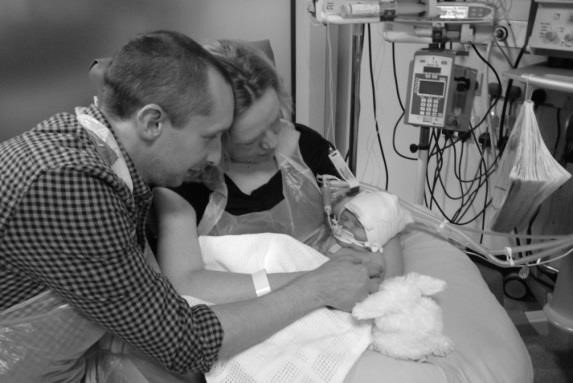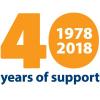As part of Sands 40th anniversary this year, we will share 40 stories by 40 parents, family members and friends affected by the death of a baby. Starting in June to coincide with Sands Awareness Month and our #FindingTheWords campaign, we aim to show the sheer number of people who are affected by the tragedy of a baby’s death, help other bereaved parents to understand they are not alone and raise awareness of the issues surrounding stillbirth and neonatal death. Visit our 40 stories for #Sands40 to view other blogs in the series.

After a perfect first pregnancy, just before 8pm on 29th December 2014 our beautiful, brave daughter Layla Kate was born. She weighed 7.1lbs.
Earlier that day, following a normal morning’s wriggling in mummy’s tummy, we noticed that Layla’s movements had slowed. As a precaution (at 41 weeks, we thought this might just be an early sign of labour) we phoned the maternity unit at Warwick hospital, and they invited us to come in for monitoring. Very quickly the hospital staff decided that Layla needed to be delivered.
We will never know what happened to our lively little girl that day, but after Layla was born via emergency caesarean section, it was clear that she was unwell. The doctors resuscitated and stabilised her before moving her to the hospital’s Special Care Baby Unit. From there she was transported in a portable incubator to the Neonatal Intensive Care Unit at Birmingham Heartland’s hospital.
The staff at both hospitals did everything they could for Layla, but she was too poorly. Our families joined us, and we are thankful that Layla’s loving grandparents, uncle and auntie had the opportunity to meet and hold her.
Layla passed away quietly in her mummy and daddy’s arms just before 6pm on New Year’s Eve, in the Eden bereavement suite at Heartlands; she was not yet 2 days old. We were, and still are, absolutely heartbroken at our loss, but we are grateful that Layla was so loved and that we could be there with her when she needed us the most.
While Layla was in intensive care at Heartlands, she was not alone. She shared the small unit with three other very poorly babies. On average, 15 babies are stillborn or die shortly after birth every day in the UK.
In the three years that have passed since Layla’s brief life ended, we have talked about her a lot. We have talked with each other, with family and friends, doctors, nurses, a psychologist, a grief counsellor, work colleagues, and with other bereaved parents through Sands. We have also had another baby – now a happy, noisy two year old called Arley.
Talking about what happened, and about Layla, has certainly helped us with the grieving process. While the grief will never truly end, the gaps between low periods become longer. Layla’s birthday, the New Year, and Christmas will always be difficult.
We made something positive out of Layla’s short life by raising money and donating much needed equipment in her memory. We also wrote to each of the NHS staff who looked after us, to thank them for all of their help.
It is incredibly difficult to know what to say to someone who has lost a child, but we think that talking about it is very important. There are no right words to use, because every person’s experience is different. Acknowledging that difficulty, expressing sympathy, being patient and allowing space will all help. As will remembering that grief is complicated, irrational, messy, and never truly ends.
Both Dan and Amanda were supported by their employers to return to work after their baby Layla died, but our #FindingTheWords survey found that many bereaved parents do not get the help they need.
If you're an employer, manager or HR professional please find out how to support bereaved parents at work. Thank you.

